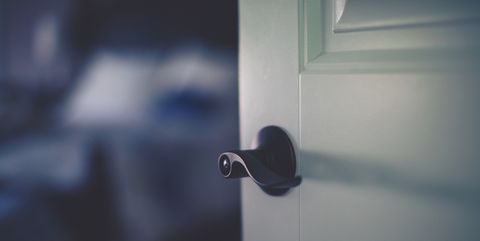
Your nightly routine can (and should) include brushing your teeth, washing your face, and getting into comfy PJs, but new information shows that most Americans skip a very important step before climbing into bed.
Nearly 60% of people sleep with their bedroom door open, according to a recent survey conducted by the safety science organization UL. That simple choice could mean life or death in the event of a house fire, as a closed door can slow the spread of flames, reduce toxic smoke, improve oxygen levels, and decrease temperatures.
With the increased use of synthetics in furniture and home construction, closing the door could make all the difference when it comes to getting out safely. The average time to escape a home fire has gone from 17 minutes to just three minutes or less in the past few decades due to flammable materials and contemporary open floor plans.
It’s not only about a lack of awareness. Most people who sleep with the door open do so because they mistakenly believe it’s safer — but it’s the exact opposite of what firefighters recommend. That’s why the UL Firefighter Safety Research Institute (FSRI) has launched a new public safety effort to coincide with National Fire Prevention Week, going on right now.
The “Close Before You Doze” campaign aims to share how closed doors can help save people’s lives. In one eye-opening demonstration, the group showed how a fire burns in a closed room versus an open one. The side-by-side video footage reveals what an impact a door can make.
View this post on Instagram
#FirePreventionWeek starts NOW, and we want you to #CloseBeforeYouDoze. Here’s a side-by-side comparison showing just how big a difference a closed door can make. Visit closebeforeyoudoze.org for the full video! #closeyourdoor
A post shared by ULFSRI (@ulfsri) on
Start making it a habit to close not only your own bedroom door at night, but your kids’ rooms as well. It’s also a good time to test smoke and carbon monoxide detectors, check your home for potential fire hazards, and review your family’s escape plan, or create one if you haven’t already. Those small precautions could make all the difference.
From: Good Housekeeping US
Source: Read Full Article